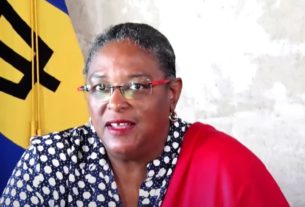Prime Minister of Barbados Mia Amor Mottley. (PMO/FP)
Prime Minister Mia Amor Mottley has again highlighted the vulnerabilities of middle income countries at an international forum, while offering suggestions which would give them the necessary “elbow room” to return to a growth path.
While delivering the keynote address at Plenary 8 of the International Conference on Sustainable Development today, Ms. Mottley said the middle income countries had fought hard to lift themselves out of poverty but were now vulnerable because of a number of things, including the climate crisis, the COVID-19 pandemic and international economic shocks.
The Prime Minister told her online audience: “Barbados has been over the course of the last few months leading a campaign within our region, to get persons to recognise that if we can isolate the COVID-related debt, then we ought to treat it in the same way that the rest of the world treated World War II debt, for example, with the British bonds that were issued, which were extremely long tenured [with] low interest rates.
“…In our case, we are asking in addition to that, that we have the elbow room from five to seven years, in order to be able to return to the development path and return to a growth path…. If, after COVID, all we can do is literally eke out an existence by paying debt, then we will have sentenced ourselves back to decades of under development, purely because we have not been innovative enough at the global level, in order to develop instruments that can give countries that elbow room, such that they can be independent again with respect to their financial management …and economic management.”
Ms. Mottley expressed the view that it was necessary for officials to relax their concept of what was an appropriate fiscal anchor. She added that they needed to look at whether the debt to GDP ratios that countries were being asked to hold to might not need to be relaxed over the next few years.
“Because generally, most countries and most developing states will in fact see an increase in debt somewhere between 15 and 30 per cent of GDP, largely because most small states do not have any other option….
“Once you have tourism and travel dependent countries whose dependence is in excess of 35/40 per cent of GDP, the revenue is not coming in, the level of unemployment has skyrocketed, [then]…the only ability…to sustain the implosion of the private economy, is for the state to step in and…save livelihoods,” the Prime Minister stated. During her address, she listed hurricanes, drought, and Sargassum seaweed as some of the areas of concern. She noted that the names for this year’s hurricane season, which ends on November 30, have already been exhausted and officials are now in the Greek alphabet.




